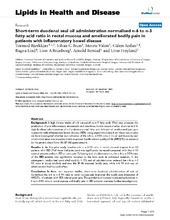Short-term duodenal seal oil administration normalised n-6 to n-3 fatty acid ratio in rectal mucosa and ameliorated bodily pain in patients with inflammatory bowel disease
Bjørkkjær, Tormod; Brun, Johan Gorgas; Valen, Merete; Arslan, Gülen; Lind, Ragna Anne; Brunborg, Linn Anne; Berstad, Arnold; Frøyland, Livar
Peer reviewed, Journal article
Published version
Permanent lenke
https://hdl.handle.net/1956/3612Utgivelsesdato
2006-03-20Metadata
Vis full innførselSamlinger
Originalversjon
https://doi.org/10.1186/1476-511x-5-6Sammendrag
Background: A high dietary intake of n-6 compared to n-3 fatty acids (FAs) may promote the production of pro-inflammatory eicosanoids and cytokines. In two recent studies, short-term (10- day) duodenal administration of n-3 polyunsaturated fatty acid rich seal oil ameliorated joint pain in patients with inflammatory bowel disease (IBD). Using unpublished data from these two studies we here investigated whether normalisation of the n-6 to n-3 FA ratio in blood and tissues by seal oil administration was associated with improved health related quality of life (HRQOL) as assessed by the generic short-form 36 (SF-36) questionnaire. Results: In the first pilot study, baseline n-6 to n-3 FA ratio in rectal mucosal biopsies from 10 patients with IBD (9 of those had joint pain) was significantly increased compared with that in 10 control patients without IBD or joint pain. Following seal oil administration, the n-6 to n-3 FA ratio of the IBD-patients was significantly lowered to the level seen in untreated controls. In the subsequent, randomized controlled study (n = 19), seal oil administration reduced the n-6 to n-3 FA ratio in blood similarly and also the SF-36 assessed bodily pain, while n-6 FA rich soy oil administration had no such effect. Conclusion: In these two separate studies, short-term duodenal administration of seal oil normalised the n-6 to n-3 FA ratio in rectal mucosa and improved the bodily pain dimension of HRQOL of patients with IBD-related joint pain. The possibility of a causal relationship between n- 6 to n-3 FA ratio in rectal mucosa and bodily pain in IBD-patients warrants further investigations.
